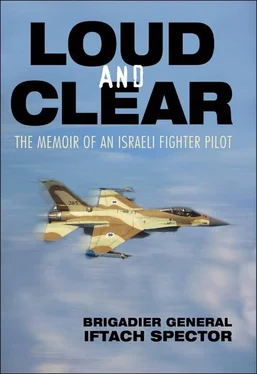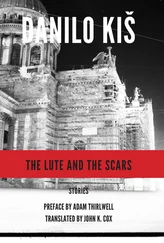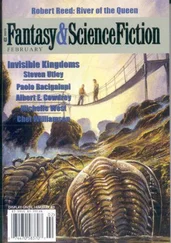Everybody knew that the Scorpions accepted only the crème de la crème Who hadn’t dreamed of getting here? And there we were on that balcony, a bunch of rookies who had just finished operational training. It was electrifying. It was scary.
So we trembled there in the cold wind, proud and glad, and looked around.
On the tarmac in front of us sat five large, beautiful Super Mysteres. Their crystal canopies hung over their open cockpits, as if hovering in the air. The shining Plexiglas sparkled in the morning sun. Each of the aircraft sported two round, plump fuel tanks that peered at us from beneath the wings, their tips bulging like aroused nipples. With their long, sleek body lines, the Super Mysteres looked to me like a group of women lying on a rug, chatting and waiting.
I lowered my eyes. My friend Zur, called ZBB, smiled at me in wordless complicity.
I looked again at the Super Mysteres and felt a wave of excitement. Within a week or two I would make my first flight in this advanced, powerful machine. Could I handle it? And immediately the momentum would begin building—within two months we would try the aerial firing range, and whoever hit the towed flag—the drogue—would be inducted into the small, elite group of fighter pilots, those few who defend the skies of Israel daily.
I knew which of us would hit the drogue. I knew it would not be me.
Suddenly the whole process seemed too fast—way too fast. Only yesterday I was a kid, the shepherd of Kibbutz Givat-Brenner, a boy humming pop tunes in the fields and admiring Col. Ariel Sharon’s paratroopers. Then the Sinai War of 1956 came from nowhere, blackouts were in force, and our teachers carried guns. My sixteen-year-old classmates dug trenches in the lawns. And after that came my flight craze. At night in the underground shelter of the kibbutz, I built model planes and tried to figure out the laws of aerodynamics. When the girls put on black skirts and white blouses and went dancing in the evenings, I stayed in my room, immersed in books about war that smelled of long use, most of them translated from Russian. For some time I read randomly, immersed in things such as Hannibal’s tragic fate. Then I discovered World War II. I became entranced by Alexei Merseyev, a Soviet fighter pilot who fought the Nazis (like my own father), lost both his legs, but returned to aerial combat to shoot down Messerschmitts. Merseyev became a hero of the USSR, and I walked the fields, waving a stick and cutting wild flowers the way he did, and swearing aloud.
Finally my induction notice came, then the smell of the high-octane fuel of the Harvard trainer and the propeller’s noisy, dissonant whine. Then the heart-stopping takeoff—as if I were being sucked right up into the sky between two screaming Meteor jet engines—and before I knew it I had my wings, and I stood looking at the Super Mysteres from the balcony of the Scorpions squadron.
It was so fast.
A DOOR OPENED and a head with thick, short, red hair peered out. Nissim noticed us standing there and rushed back in, roaring in a loud voice in his Bulgarian accent, “They’re here!”
A long sh… sh was heard from the inside of the room. Nissim slammed the door. We looked at each other, wondering. A thin black dog crawled out from beneath the building, stretched herself, yawned, and finally rose to smell us and lick Uri Sheani’s hands. We all crowded around to touch her fur for luck. Lira was the famous mascot of the Super Mystere pilots.
Dogs and all kinds of animals loved Sheani. He was a nature boy who used to raise swamp cats in his parents’ room at his kibbutz, Ein-Harod, in the Izreel Valley. His little tigers tore the curtains to strips and frightened the neighbors. When we went AWOL from base, the vicious watchdogs guarding the fences stopped growling and cowered before Sheani, begging to be petted.
He was a short, muscular young man with straw-colored hair and a square face. His eyes were pale blue above a charming smile flashing lots of white teeth. His broad jaws and the dimple in his chin hinted at the tremendous willpower hidden behind the smile. Two years earlier, when we air cadets were tested for strength of character in the thirty-five-kilometer field run with full equipment, Sheani made it first to the end, limping badly. But when he took his shoes off, the faces of the instructors went pale. The soles of his feet were bloody minced meat. I was always an admirer of good sportsmanship, but this was something more than athletic prowess.
Uri Sheani was superb at orienteering. In one of our few breaks in the flight course, we decided to drive around the whole Negev—Israel’s southern desert—to survey the benchmarks and take pictures. It was a ten-day trip. We were five boys on a rented jeep, and only one of us had a driver’s license, but we all abused the small vehicle over hundreds of kilometers of sand and rock. The jeep rewarded us in kind when we had to carry it on our backs through the wadis and down the steep slopes of the Yehuda Desert, down to Ein-Gedi on the coast of the Dead Sea, three hundred meters below sea level.
Uri sniffed the air like an animal and found water for us. When we fell asleep, dead tired, near the bonfire, he would listen to the night sounds and in the morning would show us fine footprints and wild animals hopping in the distance. When we arrived at the operational training and became acquainted with the gun sight and gunpowder, Sheani’s powerful hands could manage the Ouragan aircraft with gentle and economical nudges. He proved to be a first-class gunner. In aerial target shooting he set a record, doubling the old one.
AND STILL WE STOOD THERE, before the closed doors of the Scorpions, waiting. Nothing happened. Finally Umsh sneered and said, “Guys, what a Zikago.” We grinned at each other.
We had been together for more than two years since the five of us were in Tel Nof with a hundred other rookies brought for flight school, dressed with baggy clothes, and given over to a sergeant to the torture of the obstacle course. Then, in the middle of it all, we all were ordered to go under the rusty barbed-wire fences and thorns to collect pieces of aluminum and human flesh—all that was left of an Ouragan jet that passed over us, did a roll in the air, and augured in with a boom and a big splash of kerosene. A small fire was soon put out that left a black, fatty layer over everything and a cloying, sweet smell that stuck to skin and clothes. “What a Zikago” was the phrase Umsh coined then for any snafu.
At the end of “Ladya’s day,” our first day in the air force, many of us decided they had had enough. They smelled the stench and had second thoughts. We—the fifty boys who stayed—were sent to casual company on the base, cleaning, whitewashing, shoveling, painting—in short, waiting for the real stuff to begin. That’s how I came to know the air force, and my friends at the thirty-first pilot course.
THE DOOR OPENED AGAIN. A short, solid man came out on the balcony and faced us. The back of his thick neck was shaven and the flight suit was tight on his barrel chest. He wore no rank insignia on his worn flight suit that was almost white from many launderings.
Uncertainly, we saluted him.
“You must be the trainees!” he announced.
We nodded.
“Welcome to the Scorpions!”
And suddenly he gave us a warm, beautiful, contagious smile, which lit up his big, heavy face. We all smiled back at him. This was our introduction to Capt. Zorik Lev, the legendary vice commander of the legendary commander of the best fighter squadron in the Israeli Air Force. Zorik never wore rank insignia on his shoulders or wings on his chest. This was a kind of coquettish modesty; just looking at him told you who and what he was.
“PUT YOUR RUCKSACKS HERE. Here! And go into that room! Hurry, move it!”
Читать дальше












